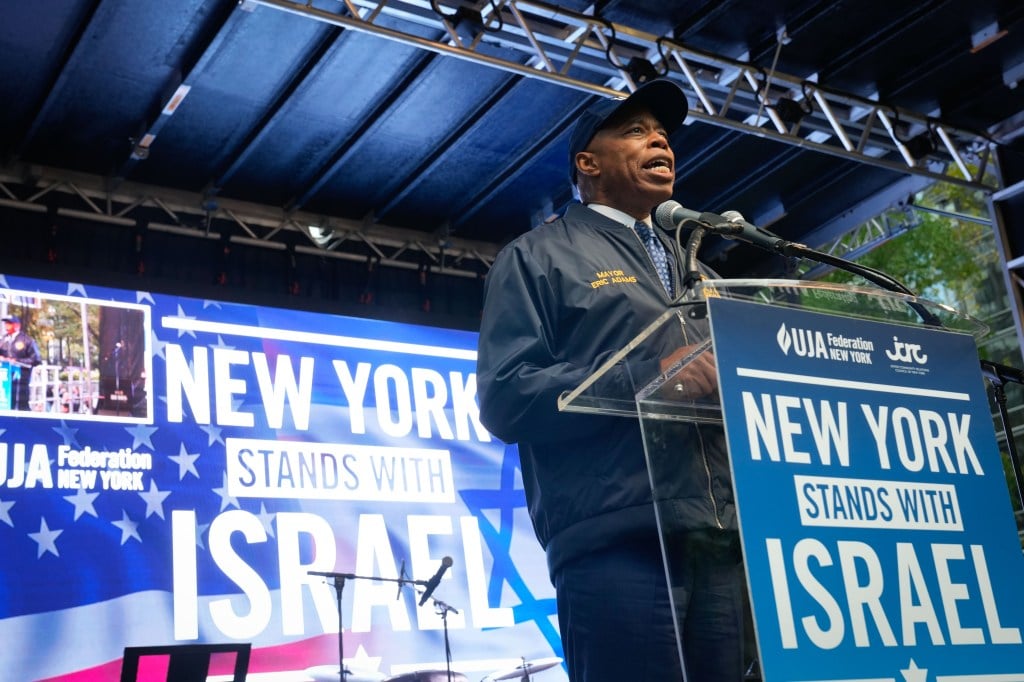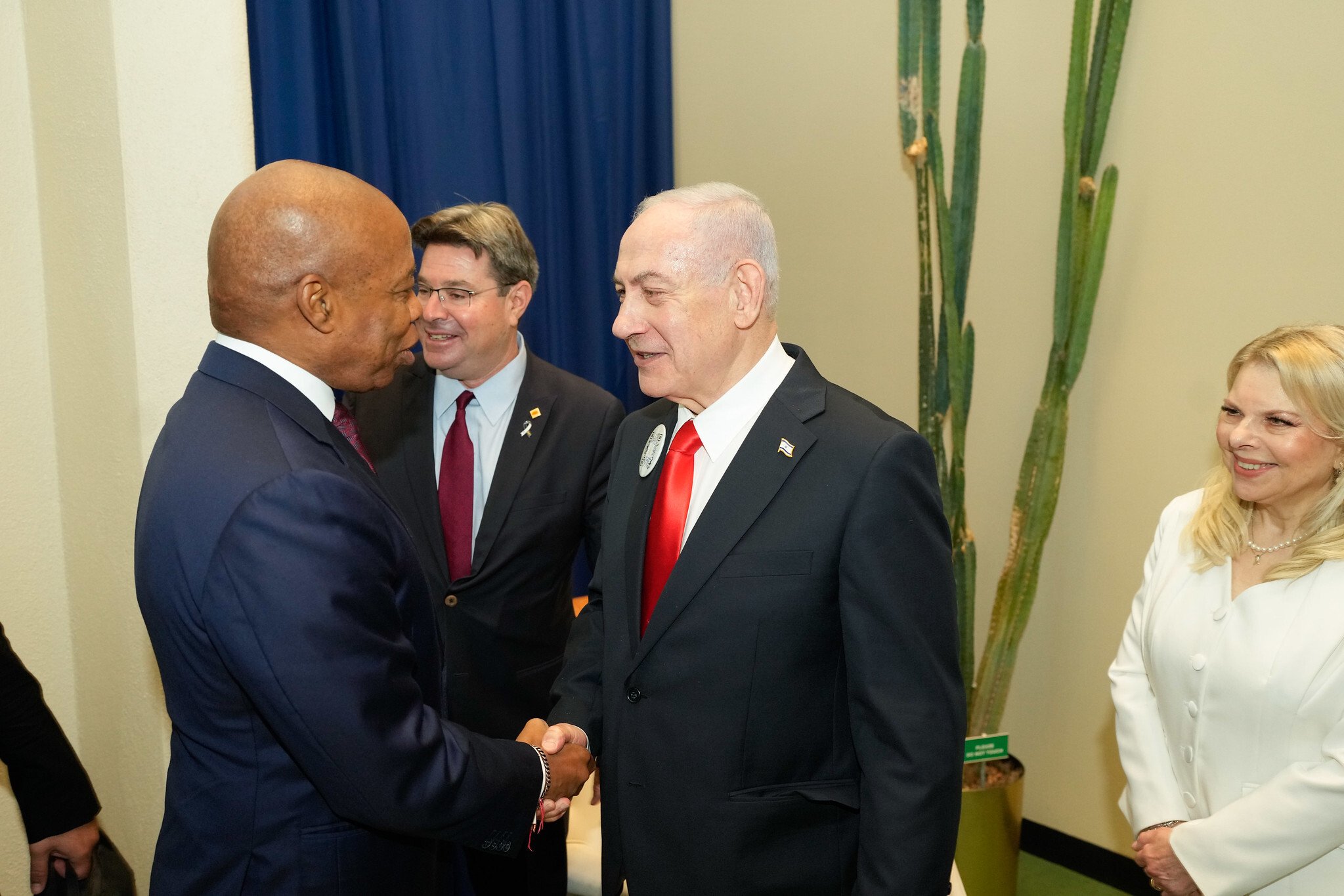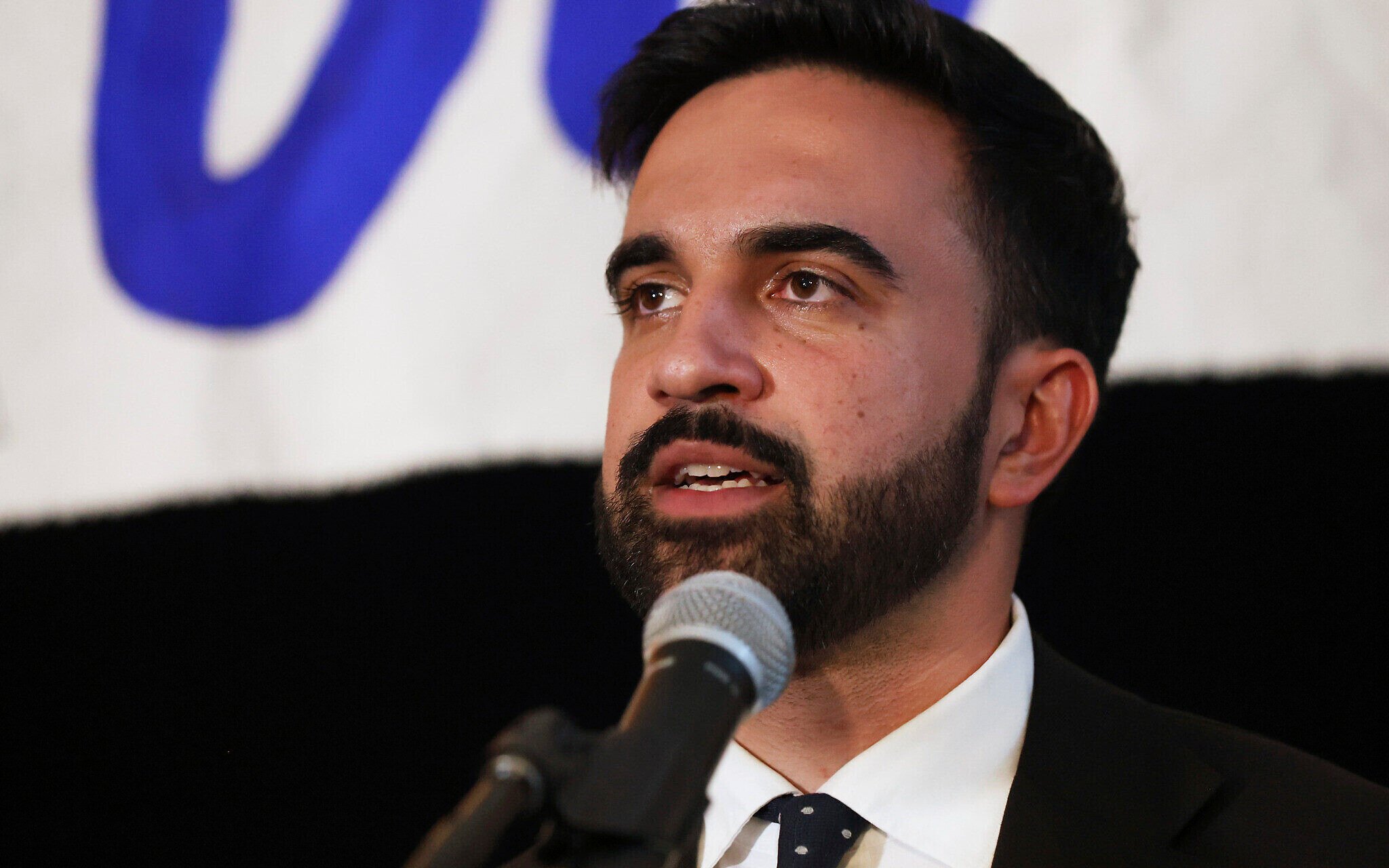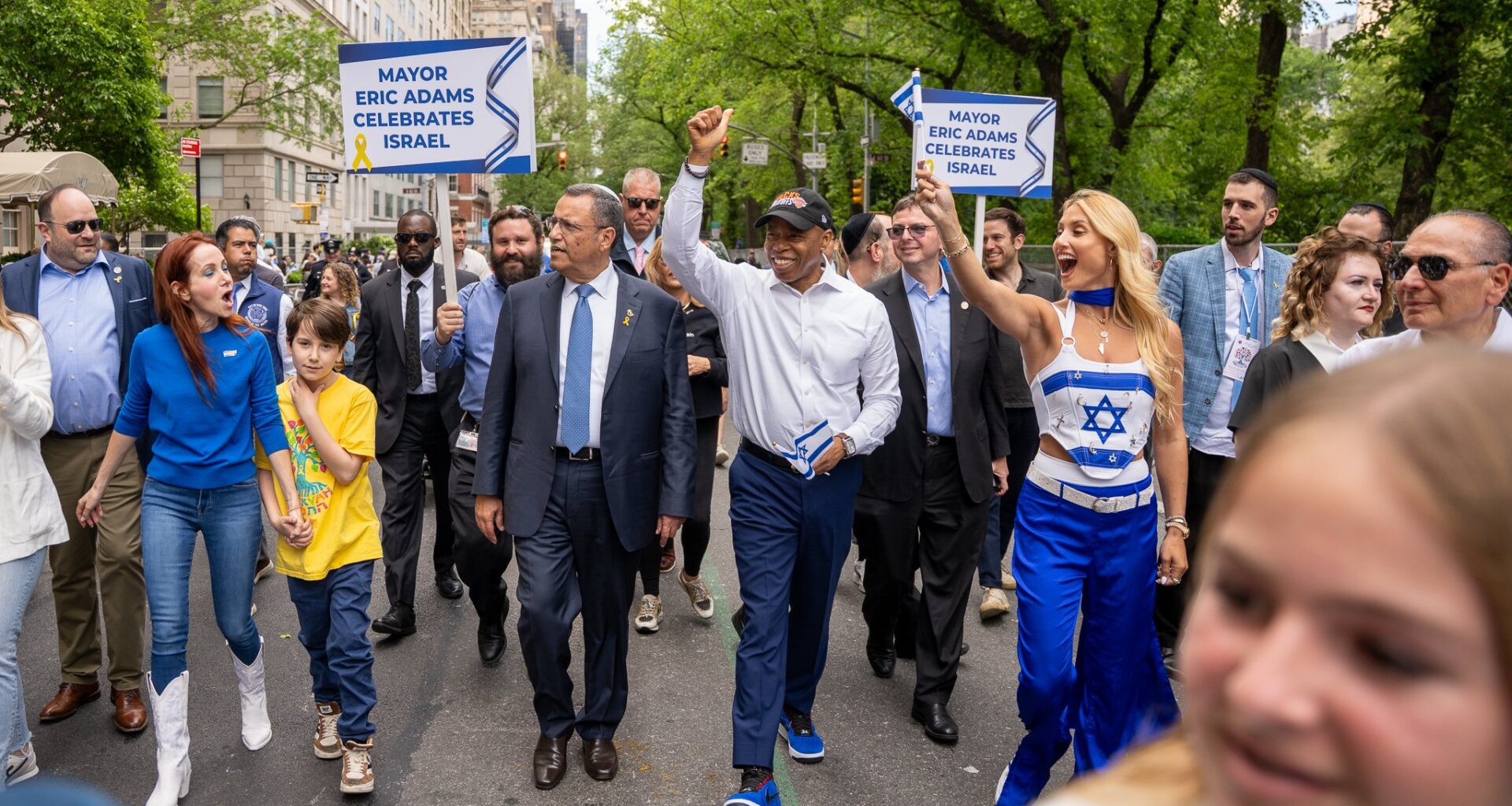As Eric Adams approaches the conclusion of his term as New York City’s mayor, it is time for reflection.
New York is a city that contains multitudes. Within its five boroughs, one can feel the diversity of the Jewish diaspora in all its expressions. A mayor who truly understands the pulse of this city must recognize that its Jewish heartbeat is woven into New York’s civic DNA.
Whatever one thinks of Eric Adams’s management style, he grasped this truth more instinctively than many of his predecessors. As Brooklyn Borough President, he had already visited Israel. He opposed the Boycott, Divestment and Sanctions (BDS) movement. And he spoke openly about the spiritual and moral kinship between New York’s diverse communities and the Jewish state.

Michael Appleton/Mayoral Photography Office
As mayor of New York City, he institutionalized that sentiment. In June 2025, Adams signed an executive order adopting the International Holocaust Remembrance Alliance (IHRA) definition of antisemitism for all city agencies. That decision positioned New York among the few major cities worldwide to give formal legal weight to a definition protecting Jews from both traditional and contemporary forms of antisemitism — including those disguised as anti-Zionism.
Adams’s frequent appearances at synagogues — Park Avenue Synagogue, Temple Emanu-El, Central Synagogue, Park East Synagogue, and others — were more than just symbolic gestures. He joined services, comforted communities, and stood physically beside Jewish New Yorkers in times of grief and fear. He spoke of the moral obligation to stand with Israel and with Jews around the world, explicitly linking antisemitic hatred to the broader assault on democratic civilization:
“Those who call for the death of Jews across the globe are also calling for the death of Americans.
That same moral clarity was on display when Adams met with Prime Minister Benjamin Netanyahu in New York during the 2025 United Nations General Assembly. While many political leaders avoided Netanyahu amid shifting public opinion, Adams chose the opposite path. After their meeting, he declared:
“I was particularly proud to meet with Prime Minister Netanyahu after his address to the United Nations, to thank him for defending the Western world and our way of life. At a time when much of the world is turning its back on the Jewish State of Israel, the mayor of the largest Jewish community outside of Israel must remain steadfast in our support for Israel, its right to defend itself, eliminate Hamas, and bring every single one of their hostages home.
Adams’s statement reflected his clear conviction that solidarity with Israel is part of the moral architecture of Western democracy.

New York City Mayor Eric Adams meets Prime Minister Benjamin Netanyahu at the United Nations General Assembly, September 26, 2025. (Michael Appleton/Mayoral Photography Office)
Adams’s tenure surely did not solve every challenge facing Jewish New Yorkers — from rising antisemitic incidents to campus hostility and the need for deeper interfaith literacy. Adams also faced legitimate criticism regarding city management, policing, and budget priorities. But he reminded the city that the fight against hatred begins with moral vocabulary. His central message remained constant: antisemitism is not a Jewish problem; it is a human problem. By framing solidarity with Jews as part of the universal struggle against hatred, he strengthened the moral coalition between Jewish and non-Jewish New Yorkers alike. Even his critics within the Jewish community — including those who disagreed with aspects of his governance — rarely questioned his sincerity in defending Jewish security and Israel’s legitimacy.
Jewish tradition teaches hakarat hatov — the recognition of the good: Thank you, Mayor Eric Adams!
Will Zohran Mamdani be the next Mayor of New York City?
As the city prepares for its next mayoral election, polls indicate that Zohran Mamdani, the assemblyman from Queens, has taken the lead. His rise signals both demographic and ideological transformations in New York politics.
Mamdani’s political identity is rooted in social-justice activism, tenant rights, and a brand of moral foreign-policy rhetoric. On domestic issues, his platform appeals to younger voters and segments of the left who viewed Adams as too centrist and pragmatic.
But on Israel, Mamdani’s record is unequivocally confrontational and hostile. He supports the BDS movement, has repeatedly accused Israel of “genocide” in Gaza, and has refused to affirm Israel’s right to exist as a Jewish state.

Democratic mayoral candidate Zohran Mamdani speaks at his primary election party, in New York City, June 25, 2025. (AP/Heather Khalifa)
Rabbinic Responses to the Election
More than 1,000 U.S. rabbis — a cross-denominational coalition of Orthodox, Conservative, Reform, and independent voices — recently signed an open letter opposing Mamdani’s candidacy and the political normalization of anti-Zionism. The open letter, published by the Jewish Majority Initiative under the title “A Rabbinic Call to Action,” declared:
“A Rabbinic Call to Action: Defending the Jewish Future
As rabbis from across the United States committed to the security and prosperity of the Jewish people, we are writing in our personal capacities to declare that we cannot remain silent in the face of rising anti-Zionism and its political normalization throughout our nation. When public figures like New York mayoral candidate Zohran Mamdani refuse to condemn violent slogans, deny Israel’s legitimacy, and accuse the Jewish state of genocide, they, in the words of New York Board of Rabbis president Rabbi Ammiel Hirsch, “Delegitimize the Jewish community and encourage and exacerbate hostility toward Judaism and Jews.”
As prominent New York City Rabbi Elliot Cosgrove stated in a recent sermon, “Zionism, Israel, Jewish self-determination—these are not political preferences or partisan talking points. They are constituent building blocks and inseparable strands of my Jewish identity. To accept me as a Jew but to ask me to check my concern for the people and state of Israel at the door is a nonsensical proposition and an offensive one, no different than asking me to reject God, Torah, mitzvot, or any other pillar of my faith.”
We will not accept a culture that treats Jewish self-determination as a negotiable ideal or Jewish inclusion as something to be “granted.” The safety and dignity of Jews in every city depend on rejecting that false choice.
Therefore, we call on all Americans who value peace and equality to participate fully in the democratic process in order to stand up for candidates who reject antisemitic and anti-Zionist rhetoric, and who affirm Israel’s right to exist in peace and security.
We also call on our interfaith and communal partners to stand with the Jewish community in rejecting this dangerous rhetoric and to affirm the rights of Jews to live securely and with dignity.
Now is the time for everyone to unite across political and moral divides, and to reject the language that seeks to delegitimize our Jewish identity and our community.
The rabbis warned that Mamdani’s rhetoric — equating Israel with apartheid or genocide — echoes patterns of demonization that have historically preceded violence against Jews. They fear that under his leadership, the world’s most symbolically important Jewish diaspora city could become a platform for narratives hostile to Jewish self-determination.
Two other prominent voices illustrate this debate vividly.
Rabbi Mark Wildes warned that Mamdani’s rhetoric “weaponizes moral language.” Drawing on the weekly Torah portion, he compared Mamdani’s discourse to the builders of Babel:
“The Kabbalists teach that the goal of Babel’s builders wasn’t to reach God, but to manipulate the sacred power of speech to construct a false narrative. Words that should build became scaffolding for revolt. Zohran Mamdani uses a veneer of moral language — ‘justice,’ ‘freedom,’ ‘apartheid,’ ‘genocide’ — to frame a narrative about Israel and its war against Hamas. On October 7, he called Hamas’s massacre merely a ‘war crime,’ yet brands Israel’s defensive war a ‘genocide.’ The inversion speaks for itself.
He counts on voters to resonate with buzzwords like ‘justice’ and ‘human rights.’ But when those words are used to justify the slaughter of Jews while criminalizing Israel’s right to self-defense, it’s not moral clarity — it’s Babel all over again: a single, crowd-pleasing language masking a single aim.
When critique becomes a cloaked denial of purpose, we are back at the foot of the same tower. The weapons are words, and the casualties are truth and peace. If Mamdani becomes mayor, his rhetoric will matter. A leader who frames a nation’s right to defend itself as the problem, and defines its response as ‘genocide,’ isn’t speaking truth to power — he’s speaking power into falsehood. And like the builders of Babel, every tower built on distortion eventually crumbles under the weight of its own lies.
“To be clear, unequivocal, and on the record: I believe Zohran Mamdani poses a danger to the security of New York Jewish community. Mamdani’s refusal to condemn inciteful slogans like “globalize the intifada,” his denial of Israel’s legitimacy as a Jewish state, his call to arrest Israel’s Prime Minister should he enter New York, and his thrice-repeated accusation of genocide in Thursday’s debate – for these and so many other statements, past, present, and unrepentant – he is a danger to the Jewish body politic of New York.
Mamdani’s distinction between accepting Jews and denying a Jewish state is not merely rhetorical sleight of hand or political naivete, though it is, to be clear, both of those things. His doing so is to traffic in the most dangerous of tropes, an anti-Zionist rhetoric that, as we have seen time and again – in Washington, in Colorado, in ways both small and large, online and in person – has given rise to deadly antisemitic violence. This past summer, you may recall, at the Glastonbury Music Festival in England, the crowd erupted into chants of “Death to the IDF.” Where exactly would a Mamdani administration stand should that happen next summer in a concert on Governors Island, or in Central Park? I am not one to play the politics of fear. The entire thesis of my career is to play offense, not defense. But today, as I have before, I am throwing a flag on the field and calling out a threat to the Jewish people five minutes early rather than risk being five minutes too late.
Clear, unequivocal, and on the record: Mamdani poses a danger to the security of the New York Jewish community, and – if you play out the chess game of Democratic party politics – a danger that could have much wider consequences.
However, other rabbis voiced discomfort with the tone of the initial call. They hesitated to sign — not because they disagreed with its moral substance, but because they worried about deepening communal rifts and blurring the boundary between religious leadership and electoral endorsement. Rabbi Angela Buchdahl of Central Synagogue wrote a message to her congregation:
“As a Central clergy team, we have spoken from the pulpit in multiple past sermons and will continue to take a clear, unambiguous position on antisemitism, anti-Zionist rhetoric, and our deep support for Israel. But it is up to each of us to vote our conscience. Central Synagogue is a Jewish spiritual home, not a political organization. Political endorsements of candidates are not in the best interest of our congregation, our community, or our country.
What comes next?
If elected, Mamdani would not dictate U.S. foreign policy. But the mayor of New York wields a subtler power — the power to shape moral atmosphere. When a leader portrays Israel as a pariah state, that framing seeps into classrooms, city agencies, and street culture. It emboldens those who harass Jews under the pretext of “anti-Zionism.”
Conversely, when a leader like Eric Adams insists that antisemitism in any form is intolerable, when he shows up at synagogues and affirms that the Jewish story is part of the city’s moral DNA, he teaches citizens how to stand up for one another.
In political science, this is known as the educative function of democracy — the capacity of democratic leadership to cultivate civic dispositions and moral sensibilities within the citizenry. Adams taught empathy and vigilance. He defended Jewish dignity while maintaining New York’s multicultural cohesion. Mamdani, by contrast, has taught moral suspicion of Zionism itself. That risks fracturing the delicate equilibrium that makes New York’s pluralism thrive. A city whose moral imagination cannot include the legitimacy of Jewish nationhood is a city losing touch with its own pluralistic soul.
As New York approaches the next election, the task for the Jewish community is to ensure that the city remains a place where Jewish identity is a source of civic strength. Whether through mobilizing voters, educating allies, or engaging in honest dialogue, the community must act with courage and clarity.
The next mayor — whoever it will be — will inherit not only budgets and bureaus but also the moral expectation that New York remain a beacon of Jewish safety and pride. If Zohran Mamdani wishes to lead this city, he must demonstrate — in deeds, not slogans — that he can fully meet that expectation. But so far, his record gives no reason for trust.

